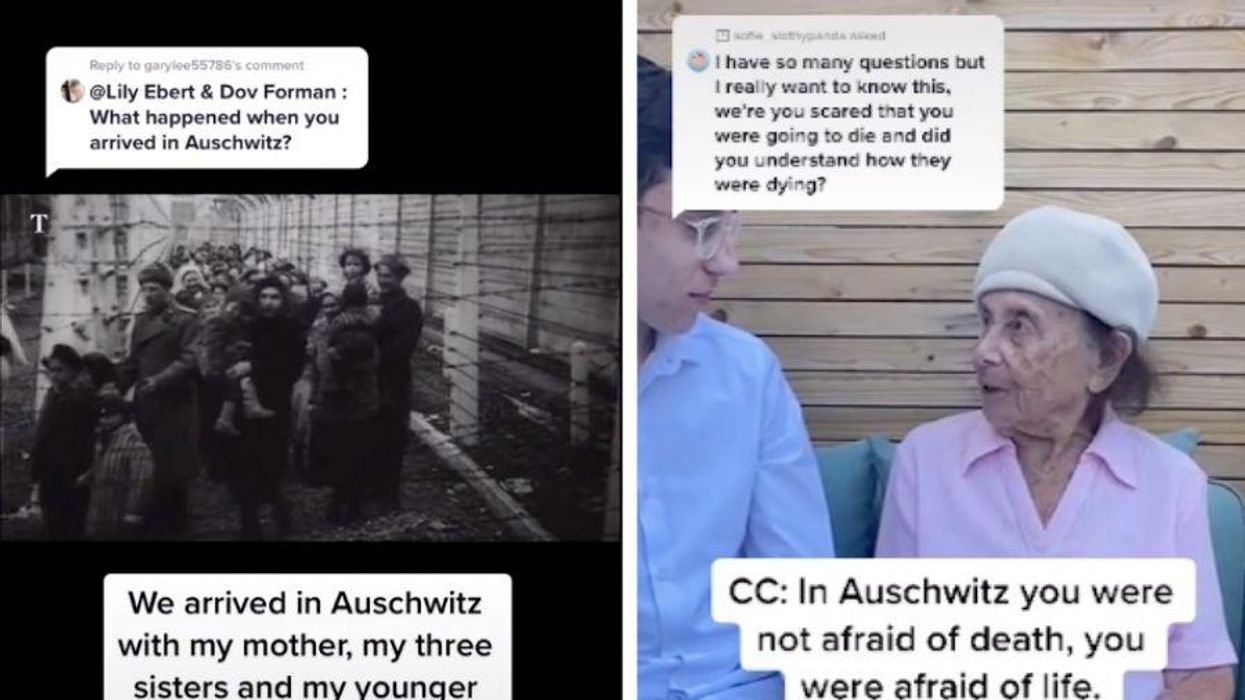
We have reached a critical point in history when the opportunity to hear live, first-hand accounts of the Holocaust are quickly dwindling. Those who survived it—and remember it—are now in their 80s, 90s and 100s, and every year their number grows smaller and smaller.
If you have the opportunity to sit down and talk to a Holocaust survivor, I highly recommend it. Many won’t have that opportunity, however, so the next best thing is bearing witness to these stories as they are shared on video. Not to discount the power of written accounts—those are vital, too—but there’s something to the human-to-human connection of hearing a person who lived through it speak about their experiences.
Some Holocaust survivors have traveled to give talks to students in schools. But at least one woman who survived the Auschwitz-Birkenau death camp is using a more modern means of reaching young people with her story: TikTok.
With the help of her great-grandson (one of her 34 great-grandchildren), 98-year-old Lily Ebert shares brief videos on her TikTok channel describing some of what she experienced during the Holocaust and answers questions viewers ask. She currently has 1.7 million followers.
Ebert was 20 years old when her family was taken from their hometown in Hungary to Auschwitz-Birkenau, the largest of the Nazi death camps. Her mother, younger brother and younger sister were immediately taken to the gas chambers and killed. Ebert was sent to work in the camp where she spent four horrifying months.
“People would say ‘four months isn’t so long,'” she said in one of her videos. “But let me tell you something. Even four minutes was too long.”
Ebert bears the tattoo of the number she was given—A-10572—on her forearm. “We were not humans,” she said. “We were only a number.”
@lilyebert Reply to @garylee55786 It was a #hell 💔 #learnontiktok #holocaustsurvivor #neverforget #jew #survivor #important #listenandlearn #viral #97yearold #u
Ebert’s story is shared in small pieces on TikTok, which can feel somewhat jarring. But TikTok is where the young folks are and reaching them with personal stories like this might be one of the most effective ways of reaching them.
People ask Ebert lots of questions and she answers some of them in videos. For instance, someone asked if she was scared she was going to die. Her thoughtful pause is as telling as her answer.
“In Auschwitz you were not afraid of death,” she said. “You were afraid to live.”
Some people ask questions that we don’t see answered often—details that people might be curious about. In one video, Ebert talked about what it was like to use the bathroom. Toilets were rows of holes in the ground and they were told when they could use them—there was no privacy whatsoever.
She even answered a question about what women did about their periods, explaining that most women didn’t have their periods because the physical trauma they endured prevented it.
Someone else asked if there were Nazi women at Auschwitz. Ebert said there were—and that sometimes they were worse than the men.
Another person asked if she encountered any Nazi guards who indicated that they didn’t want to be torturing and killing people. Her answer was blunt: A person who was kind would not work in Auschwitz.
Some people might wonder how going through such a heinous experience impacts a person’s faith. Her great-grandson asked her if she still believes in God after everything she endured.
“Yes, I do,” she said. “Because God didn’t do it. So-called humans did.”
Ebert has been back to Auschwitz a few times since she was liberated. It’s hard enough for anyone to see the enormous piles of shoes from people who were murdered there. It’s hard to imagine what it would be like having seen and smelled the smoke coming from the crematorium there, knowing your loved ones were among those killed.
Ebert’s “ask me anything” posts have become a way for young people to interact with that harrowing chapter of human history in a rarely accessible way. She can choose which questions to answer and give some personal insight into what the Holocaust was like.
“What was the first thing you did after liberation?” someone asked.
@lilyebert A #holocaustsurvivor answers your questions! #askmeanything #learnontiktok #survivor #neverforget #history #oldtok #love #hungarian #forjewpage #fypp
Ebert said she lay down on the floor and fell asleep. Sleep was practically impossible at the camp and she was so tired.
Another person asked why she thinks she survived the hell of Auschwitz-Birkenau.
She said she didn’t know. “But maybe it was so that I could tell you and thousands of other people what happened there. To be a witness.”
“I was really not sure that I would stay alive,” Ebert told CBS News. “It is a miracle that I am here. But I promised myself, however long I will be alive, and whatever I will do in life, one thing is sure, I will tell my story.”
@lilyebert Have I ever thought about removing my Auschwitz [tattoo] number? #holocaustsurvivor #98yearold #learnontiktok #tattoo #concentrationcamp #strongwoman #neverforget #history #gmb #holocaustmemorialday #jew #goodmorningbritain #jewish
Ebert was recently interviewed on “Good Morning Britain” and was asked if she’s ever thought about having the tattoo of her number removed. She said she had never thought about it.
“I want to show the world because to see something or to hear about it makes a big difference. And the world should know how deep they cut, how deep humans can go.”
Thank you, Lily Ebert, for being willing to answer questions to help educate younger generations on the realities of the Holocaust so we can strive to make sure humanity never allows such atrocities to happen again.
